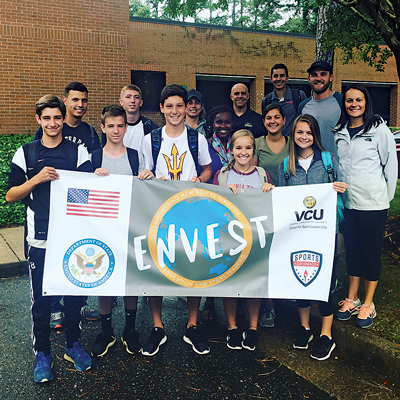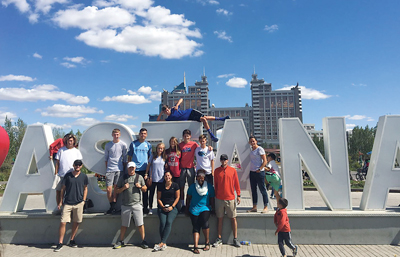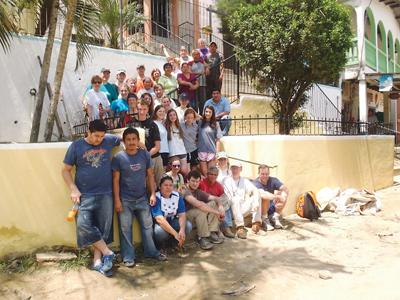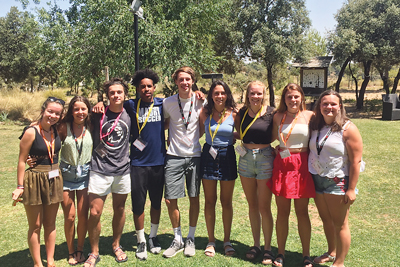When Karen and Pat Morrissey registered their son, Michael, to play soccer with the Richmond Strikers, they didn’t realize that the idea of soccer as the world’s game would apply quite so literally. I mean, soccer at Striker Park, sure. Bryan Park,
no problem. But Kazakhstan?
As it turned out, Michael’s opportunity to travel to Kazakhstan this past summer was about much more than soccer. The Strikers, along with the Center for Sport Leadership at VCU (CSL), sent a delegation of players and coaches to be a part of the global ENVEST (Empowering New Voices through Education and Sports Training) initiative to spend a week with delegations from three other countries: Kazakhstan, Kyrgyzstan, and Tajikistan. The trip was sponsored by the State Department through a grant to the CSL, which meant it would cost a fraction of what it might normally cost for participating families.
Still … Kazakhstan.
Not only had Michael not traveled internationally before, he had never even been on a plane. “The flying part was what I was most worried about,” admitted Karen.
There were other worries, as well.

“We researched Kazakhstan online and checked out State Department reports to see if there were any concerns about the area,” said Karen. “We saw that the area where they were going was a very modern city that was hosting the World Expo.”
Of course, Michael needed a passport. And what about vaccinations? Karen and Pat checked with the CDC website and Michael’s pediatrician to make sure he was covered. And then there was the matter of keeping in touch, which meant dealing with the cell phone carrier to learn about charges for calls and texting.
And then there were cultural concerns. As Pat explained, “Kazakhstan is a different culture that we know very little about. We discussed this with Michael and he was aware that he would need to be on his best behavior and be very respectful of their culture.”
To top it off, Karen did not have much experience traveling internationally, so the unknown was as real for her as for Michael.
Karen and Pat found comfort in their own research, and in the fact that Michael would be traveling with people they knew and trusted through the Strikers. And they knew that opportunities such as the one that came Michael’s way are examples of a world that is smaller than ever. Online connectivity, the reduced cost of air travel, and flourishing international partnerships have opened up a whole new world of global opportunities for young people.
Sports-based cultural exchange programs like the one Michael participated in are a popular way to introduce young people to the wider world. International travel opportunities are also offered via language immersion programs, faith-based mission trips, and environmental stewardship programs, as well as more traditional student exchanges.

Still, with so much planning required, and so many unknowns, were the benefits of Michael Morrissey’s trip worth the trouble?
According to Michael, there was only one way to find out. “Go for it!” said the sophomore at Godwin High School.
The decision to send a child to a foreign land is one my wife, Dena, and I have wrestled with for both of our children, and like the Morrisseys, it was not an idea we had grown up with. I never flew until I was a senior in high school, and my teenage international exposure consisted of annual trips to Busch Gardens. Dena grew up similarly, but her career required extensive travel. By the time we started our family, her experiences had convinced us that our children would grow up in a world increasingly interconnected and interdependent.
When our older son, Ben, was a freshman in high school, he and Dena used his spring break to travel with a church group to San Pedro Sula, Honduras, for a week of mission work. It’s difficult to enumerate the ways in which their time there differed from our lives in Richmond’s comfy West End. Whenever they traveled within San Pedro Sula, they had to be escorted by an armed guard, but most of their time was spent in the mountains outside the city, where Ben spent his days swinging a sledgehammer and hauling debris, and Dena painted interior walls and learned to cook tortillas over open fires. Ben spent the evenings playing soccer with local children while Dena attempted to send me emails on the one working computer with a cranky dial-up Internet connection. By the time they returned to Richmond, both of their digestive tracts had lost the battle with unfamiliar microbes, but their eyes had been opened.
Which is exactly why we send our children abroad.
According to the World Exchange Program, an Australian-based organization promoting international student exchanges, international travel fosters learning in several different areas: language acquisition, analytical and problem-solving skills, multi-faceted approaches to subject areas, and multicultural and community perspectives on issues and events.
The Morrisseys would agree that spending time in Kazakhstan challenged Michael in many of these ways.
“Even with a language barrier,” said Karen, “he learned that people are the same, they want the same things and have similar concerns. I think he grew up and had to try some new things, including food and sleeping in a hotel room with someone he did not really know.”
Michael added, “Going into this, I expected the people from Kazakhstan to be very different than what I was used to, but I was a bit surprised at how everyone I met was so friendly and kind. The last day we were there, our American group went to the mall in Astana with the Kazakhstan group, and just the way that these people from the other side of the planet interacted with each other as friends made me realize that they were all just regular teenagers like me.”
“The kids learned leadership and communications skills around the common bond of soccer,” Pat said. “The delegation from each country planned an event to improve a cultural issue in their country. Even with a language barrier, he learned that people are the same, they want the same things, and have similar concerns.”
This past summer, it was our younger son, Sam’s turn to step out of his comfort zone and into Spain’s Andalusian region via a program called Diverbo Pueblo Inglés. Pueblo Inglés brings native English-speakers from the United States, Canada, Great Britain, Ireland, and Australia to Spain to serve as English-speaking tutors to Spanish teenagers seeking to improve their English language skills. Because Pueblo Inglés is sponsored by the Spanish government, our only financial obligation was airfare to and from Madrid. Because of the program’s immersive language environment, Pueblo Inglés was structured around intensive social interactions and lots and lots and lots of speaking. Sam does not, by nature, plunge heedlessly into new social settings. He prefers some observation and assessment before picking his place to join. This worried us more than a little, but we were happy that he was setting new challenges for himself. Still, we were not at all sure if this particular program was a good fit, or if Sam would enjoy it.

And either Spain has no Internet or cell service, or Sam is a typical 16-year-old boy, but he could have been kidnapped by Iberian wolves for all we heard from him. They say no news is good news, but this did little to allay our concerns.
When he re-emerged after two weeks, we learned it could not have gone better. Sam’s group of Anglos (as the English-speakers were known) and Spaniards could hardly imagine going their separate ways. There were many and prolonged tearful goodbyes, and he was hoarse for days because he had spent so much time in conversation during the program. Since his return to Richmond, he has spent nearly as much time on FaceTime and Houseparty “hanging out” with his international friends as he has hanging out with his local friends.
In addition to a nice boost in confidence and some great friends, Sam came home with fifty hours of credit towards his school’s community service graduation requirement. What he seemed the most proud of, however, was the fact that in order to save on the cost of laundry facilities, he had learned to hand-wash all of his clothing. (His total out-of-pocket expenditures for his two weeks in Spain was three euros – a fact that further endeared him to his budget-conscious mom.)

Our lives and livelihoods are more enmeshed than ever with people and economies the world over. This will be even more true when our children are adults, so offering them first-hand experience in foreign countries is excellent preparation for a future where operating in multinational environments will be increasingly valuable to success. But even disregarding larger global trends, international travel helps young people develop into more comfortable, confident adults. Nothing gets a person outside his or her comfort zone faster than being dropped into the middle of a distant land. Whether it’s language barriers, exchange rates, jet lag, or homesickness, learning to cope with the challenges of international travel is a great way to build that all-important resilience in a child.
All of these things – alongside the worries and the unknowns – were on Karen and Pat Morrissey’s minds when Michael’s group departed for Kazakhstan.
Was it worth it?
Karen, Pat, and Michael all declare emphatically, “Yes.”
According to Pat, “It would be easy at his age (sixteen) to think the world is only your school, your friends, and your neighborhood. Now he has a much wider view of the world.”
Karen agreed, adding, “I think, in the future, these types of programs will make a difference in the relationships that countries have with one another.”
As for Michael: “This was an experience I will remember for the rest of my life. I would definitely say to be open to trying new things and stepping out of your comfort zone. It will only make you grow as a person.”

Specifically, Michael felt like he grew through challenging himself to be more outgoing. “Typically, I’m the type of person who keeps more to myself. It was definitely hard to adjust at first, but I’m grateful that I was put in that position.”
In fact, those interactions with the other international delegations turned out to be the best part of the experience.
“I would say the best part of going on this trip was definitely the time that we spent in the school with the people from the other delegations. I loved all the time that I was able to spend interacting with them, and it was such a unique and unforgettable experience.”
It’s true that young people do not have to travel internationally to have many of these experiences and gain many of these skills. Summer camp is great for cultivating independence, and community service hours can be gained equally well right here in Richmond. America is big enough and diverse enough that we can get outside of our comfort zone by driving to Chicago or Appalachia. But the wider world offers so much more, and it’s more accessible than ever. Plus, there’s a little magic in every passport stamp.
As Michael Morrissey says, “I was very lucky to be in this situation, and I am grateful for that every day. I couldn’t recommend it enough. I can say that from this trip, I was able to see firsthand that people around the world of whatever nationality, race, gender, or sexual orientation are truly much more alike than they are credited for.”
And that is something the whole world can bear to keep in mind.
Planning on Going Global? Your Travel-Abroad Guide
Whether your child is traveling abroad for a week, a semester, or longer, there’s more to do than pack a few bags. Here are some essential planning tips travel-savvy parents should know, also known as Dena and Chris Moore’s hard-learned travel lessons, condensed to fit in a carry-on.
PASSPORT If you’re traveling internationally, you’ve got to have one. Visit travel.state.gov for official information and to apply online. Standard processing time is four to six weeks, though you can expedite that time for a fee. If you already have a passport, keep the six-month rule in mind: Many countries won’t accept your passport if it is within six months of expiring. Adult passports are good for ten years, but passports issued for children under eighteen years of age are only good for five years.
MONEY Most likely, the country you’ll be visiting will trade in a currency other than the U.S. dollar. You can try to do the math in your head, or use an app like XE Currency to help keep it straight. Ideally, you’ll want to land with some cash in the local currency, as the money exchange kiosks in airports are quite expensive in terms of exchange rates and fees. Most AAA locations have cash in popular foreign denominations, and you could also call your bank to arrange to change some money before you go.
Using your debit card at an ATM is generally the cheapest way to get cash once you are in the country. Check to make sure your debit and credit cards will work at your destination. Note: If your debit card PIN starts with a 0, change it before you go. For some reason, many foreign ATMs don’t like leading zeros, a fact we found out the hard way! For credit cards, be aware that some credit cards will add a foreign transaction fee to any credit-card purchases you make while traveling abroad, so dealing in local currency is often better (and easier). Most credit card companies also offer cards that do not charge this fee.
Also, if you are planning to use credit or debit cards, make sure that your cards are chip cards. They are still being rolled out in the US, but they have been standard in most other countries for years, and most of the foreign card readers no longer read magnetic stripes.
Be aware that most pre-paid debit cards you purchase in the United States will only work in the United States.
LANGUAGE Even if you’re traveling to a country where English is not the predominant language, you probably don’t need a crash course in the local language. Most hotel clerks, vendors, and restaurant servers (anyone in the hospitality industry) will speak at least some English. Still, it is a sign of respect for the locals if you at least learn a few common phrases like “hello,” “please,” and “thank you.” (“Where is the bathroom?” is another one worth learning.) They’ll still know you don’t speak the language, but they will appreciate that you are making the effort to recognize local customs.
CRIME AND SAFETY Though many travel destinations are safer than traveling within the United States, it pays to know what’s going on. The State Department’s Consular Information Program has general safety information, as well as any applicable Travel Alerts and Travel Warnings for every country in the world. (Visit travel.state.gov.)
We’ve also found that having a safety wallet and a passport holder that hangs around the traveler’s neck or otherwise attaches to the body are good ideas. Additionally, talk to your child about what he is supposed to do with his passport and wallet when he gets to his destination (i.e., put it in the safe in his room), as well as what he should do if it gets lost.
Be sure your child has a copy of his itinerary and all addresses and contact numbers for hosts/program staff at his destination, both in hard copy in his carry-on and electronically.
VACCINATIONS AND HEALTH CONCERNS Depending on where you are traveling, additional vaccinations might be recommended. Also, local outbreaks and epidemics can be an issue even in places where you might not otherwise need vaccinations. Check the Center for Disease Control website
at cdc.gov for official information.
INSURANCE There are many kinds of insurance coverage for your travel needs. Call your health insurance provider to see what your plan covers. If you are uncomfortable with how your U.S. coverage will work in a foreign country, you can buy an international health insurance policy just for the period of travel. For youth, these policies are very affordable as long as no extreme sports are involved (we spent $20 for a health insurance policy to cover our son on a 2-week trip to Spain). You may also wish to consider emergency medical evacuation insurance or general travel insurance (to cover lost luggage or a change in plans). Insuremytrip.com will allow you to compare policies and costs for all sorts of travel-related insurance. Several types of insurance are available that can come in handy should you encounter unexpected cancellations or health issues. The State Department maintains a list at travel.state.gov.
CELL PHONES Depending on the length of your trip and where you’re traveling, you might be able to add a temporary international plan to your existing plan that will allow you to make phone calls, send text messages, and use cellular data. Contact your wireless provider for details. Alternatively, you can buy an international SIM to use while traveling. International SIMs are available with a wide variety of minutes, text messages, and cellular data. One handy site for comparing and buying international phones and SIMs is cellularabroad.com.
Take the time to teach your child how to dial an international number on his cell phone (if he will be keeping his U.S. number while abroad). Similarly, teach him how to call home from a cell phone with a foreign SIM card if you choose to go that route.
KEEPING IN TOUCH Even in areas where cell service is limited or doesn’t work with your phone, you can usually find a Wi-Fi hotspot, and if you are connected to Wi-Fi, you can use your phone, laptop, or tablet to talk or send messages to your loved ones back home. If everyone you know uses an iPhone, iMessage will send messages over Wi-Fi. If you need to send and receive messages to multiple platforms, WhatsApp is a great text messaging app that works on both IOS and Android phones. (Note: Both phones have to have WhatsApp installed.) For video and voice calls, FaceTime is great for iPhone users, and Skype allows you to make video calls, as well. Skype also allows you
to make low-cost calls to both cell phones and landlines, should you need to go old school. And of course, there is always email.
ELECTRICITY Research electrical outlets and send your child with the appropriate electrical adapters. Ones with USB ports are very helpful for the devices the kids want to take with them.
RANDOM STUFF For luggage, less is more. Make sure your child can manage his carry-on and his suitcase without help. A backpack and a medium sized rolling duffle should be enough for almost any trip. Teach him how to do laundry; encourage him to be willing to wear clothes a couple of times before considering them dirty. Be sure your child has a change of clothes in his carry-on backpack, as well as any medicines (in their original container) or essentials. (It’s not a bad idea to send some OTC meds, like Tylenol or Pepto Bismol along just in case.) And talk to him about how to go through security (taking out electronics; no liquids, taking off shoes in the U.S.).
ONLINE RESOURCES There are lots of resources online that will give you much more detailed information on these topics. Just Google “foreign travel basics,” and you’ll get a wealth of information.





